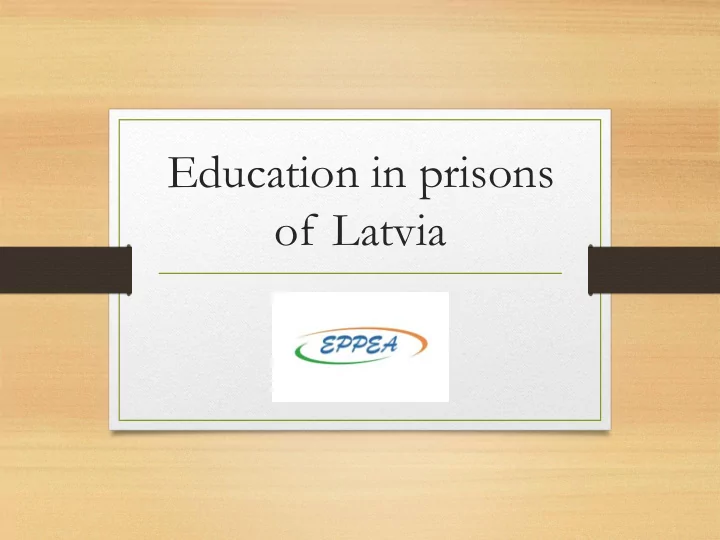

Education in prisons of Latvia
Number of prisoners (01.01.2017) • Total number - 4243
Overview • Prison population rate (per 100,000 of national population) 218 (based on an estimated national population of 1.95 million at beginning of 2017 (Eurostat) • Pre-trial detainees / remand prisoners (percentage of prison population) 30.1% • Female prisoners (percentage of prison population) 8.2% • Juveniles / minors / young prisoners incl. definition (percentage of prison population) 1.0% -
Overview • Foreign prisoners (percentage of prison population) 3.3% • Number of establishments / institutions 11 • Official capacity of prison system 5 852 • Occupancy level (based on official capacity) 75.3%
Location of inmates in prisons • Correctional institutions for juveniles – 0,54 % • Open prisons - 2,15 % • Semi-closed prisons – 15,91 % • Closed prisons - 51,31 % • Investigative prisons - 30,09 %
Breakdown of prisoners by age Prisoners by age group Number % Up to 18 80 1,6 From 18 up to 21 389 7,7 From 22 up to 25 986 19,5 From 26 up to 30 1077 21,3 From 31 up to 40 1390 27,5 From 41 up to 50 799 15,8 From 51 up to 60 268 5,3 More that 60 66 1,3
Length of sentences (imprisonment) • Average length of imprisonment in Latvia - 4,46 years males - 4,6 years females - 3,5 years
Legislation • The Latvian Constitution • Education Law • General Education Law • Vocational Education Law • Latvian Penal Code • Procedure of Detention Law
The Latvian Constitution Everyone has the right to get education. The State must provide free access to basic education and secondary education. Primary education is compulsory (112)
The Education Law According to the Education Law, Education is divided into: Education Formal Informal
Education in prison In the course of the 201 year 1978 inmates engage in less primary, primary, g eneral , vocational, higher and informal education programs.
Education programs and number of inmates
Education Act: Education Document • According to the Education Law, a student after obtaining formal education programs receive appropriate educational qualifications /document. • The document does not mention that education is obtained in prison.
Philosophy Latvian prison education planning policy is based on the following principles: • The principle of availability • The principle of separation • The principle of development • The principle of continuity and succession • The principle of re-socialization
The principle of availability All prisoners must be ensured with access to education, which consists of general education, vocational education, creative and cultural activities, physical activities, social and educational opportunities for access to information in libraries and information opportunities provided by modern communication technologies
The principle of separation Education for prisoners should be like the education provided for similar age groups outside of prisons. Prisoners must have as wide possibility to choose training subjects as possible.
The principle of integration Prisoner education is organized in the country in the institutional frames of existing education and training
Principle of development Prisoner education must be evolutionary. Its mission is to develop the personality as a whole, taking into account social, economic, cultural and developmental characteristics and needs
The principle of continuity and succession Education offered in prisons should provide possibility to continue the education in another prison and integrate in the total public education system after release from prison
The principle of re-socialization Education is one of the most important element in the process of resocialization
General education • 1244 prisoners from 11 prisons were involved in general education programs
Vocational education 710 inmates from 9 prisons were involved in vocational training programs, that have been accredited by the state
Vocational education
Specialities • Elektrician (Jelgava, Jēkabpis, Rīgas Centrācietums ) • Stoker (Jēkabpils) • Tailor (Iļģuciems, Brasa, Rīgas Centrālcietums, Jelgava) • Woodworker’s (Jēkabpils, Daugavgrīva, Šķirotava, Valmiera) • Welder (Jelgava, Jēkabpils, Šķirotava, Valmiera) • Lathe operator (Jēkabpils) • Finishing worker (Jēkabpils) • Bricklayer (Daugavgrīva) • Cook’s mate (Iļģuciems, Jēkabpils) • Hairdresser (Iļģuciems)
Informal education 849 inmates (19% of prison population) were involved in informal programs
Informal education
Informal Education
Mediation – mission is (im)possible - Daugavgrīvas Prison Daugavpils Department - 12 Life-long sentenced inmates - 10 sessions - Daugavpils University students
Informal program for persons ’ action understanding, their contribution to the provision of the restoration of justice. Conversation and cooperation without disagreements, disputes and conflicts. Social Painting Joga Work with natural materilas Group work Role plays Dumb show Creation of emotional masks
Projekts Stāsts par sevi Story about myself The aim of the project is to create the film for preventing the crime commiting by young persons, to retratin them from incorrect action.
Daugavgrīvas Prison Grīvas Department 8 persons 10 sessions Daugavpils Art School students Daugavpils Street Workout Association members
«I can, I can» Daugavgrīvas Prison Grīvas Department 15 persons 10 sessions Daugavpils Art School students Daugavpils Street Workout Members
Sport inside the Prison • 2016 - 627 Sport competitions (Voleyball, Footbal, Table tennis, Chess, Darts) Section 8. Purpose of the Execution of Punishment The purpose of the execution of punishment is to apply all the provisions of the execution of a punishment laid down in this Code to the convicted person, thereby ensuring the resocialisation of the person and his or her lawful behaviour after execution of the punishment. The Sentence Execution Code of Latvia [14 July 2011]
Latvia opens addiction treatment center at Olaine prison «The idea is that mentors will play these team sports together with the inmates and learn [to cooperate]. It's part of the therapy»
Recommend
More recommend